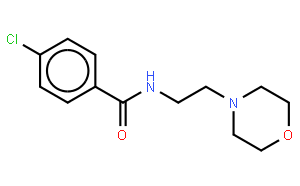| In vitro |
Moclobemide orally administered 2 hours before decapitation preferentially inhibits MAO-A and PEA in rat brain with ED50 of 7.6 μmol/kg and 78 μmol/kg, respectively. Moclobemide orally administered 2 hours before decapitation preferentially inhibits MAO-A and PEA in rat liver with ED50 of 8.4 μmol/kg and 6.6 μmol/kg, respectively. Moclobemide (0.1 mM), which inhibits brain MAO-A activity by over 80%, does not affect benzylamine oxidase (rat heart) and diamine oxidase (rat small intestine) activity in vitro. [1] Moclobemide (10 mM-100 mM) includes in the culture medium during anoxia or with glutamate significantly increases in a concentration-dependent manner the amount of surviving neurons compared to controls in neuronal-astroglial cultures from rat cerebral cortex. [2]
|
| In vivo |
Moclobemide (10 mg/kg p.o.) induces a significant decrease of all monoamine metabolites measured in rat brain. [1] Moclobemide, given via the drinking water (4.5 mg/kg/day), produces significant decreases in adrenal weight of rats after 5 (-23%) and 7 weeks (-16%) of treatment. Moclobemide upregulates hippocampal mineralocorticoid receptor (MR) levels in rats by 65%, 76% and 19% at 2 weeks, 5 weeks and 7 weeks of treatment, and upregulates Glucocorticoid receptor (GR) levels in this limbic brain structure by 10% at 5 weeks. Moclobemide treatment (5 weeks, 4.5 mg/kg/day) significantly attenuates stress (30 min novel environment)-induced plasma ACTH (-35%) and corticosterone (-29%) levels. [3] Moclobemide (2.5 mg/kg/day) decreases immobility and increases climbing behavior following treatment for 3 days, but increases in both swimming and climbing behaviors are measured following treatment for 14 days. Moclobemide (15 mg/kg/day) decreased immobility and increased swimming for 3 days, whereas treatment for 14 days significantly increases both active behavior (swimming and climbing). [4] Moclobemide (100 mg/kg/day) combined with triethyltin blocks the development of brain edema and the increase in the cerebral chloride content induced by triethyltin in rats. Moclobemide (100 mg/kg/day) reduces the increase in the cerebral sodium content and attenuates the neurological deficit in rats. [5]
|

 COA
COA MSDS
MSDS HPLC
HPLC NMR
NMR